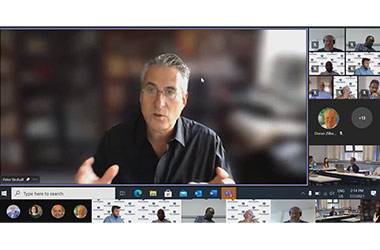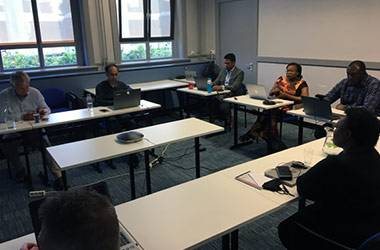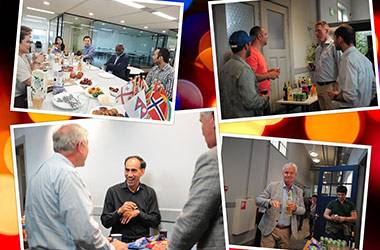Wittenborg Online News!
Wittenborg Teachers' Creativity & Innovativeness Revealed during Pedagogy Strategies Meeting
Wittenborg Teachers' Creativity & Innovativeness Revealed during Pedagogy Strategies Meeting
Wittenborg Teachers' Creativity & Innovativeness Revealed during Pedagogy Strategies Meeting

Faculty Members Meet for Reflections on Teaching & Learning
As Wittenborg’s academic school year came to a close this week, its faculty members came together for an informal teachers pedagogy strategies meeting. The main aim of the meeting is to gather teachers' reflections and to have open discussions on teaching and learning, one year into the pandemic. The event was held on Wednesday, 7 July, via hybrid mode at its Spoorstraat campus and MS Teams. The meeting was attended by lecturers from all of its four campuses, in Apeldoorn, Amsterdam, Munich (Germany) and Bad Voslau (Austria).
The meeting served to provide a platform for teachers to share and discuss innovative and effective teaching pedagogies that have worked well in both online and physical lessons. Topics discussed also revolved around strategies to increase student engagement in class and retention of current digital tools, as well as incorporating new ones.
Head of School of Business Dr Rauf Abdul opened with a welcoming speech and thanked the teachers for taking time to join the meeting. He announced that, for the next academic year (2021-2022), Wittenborg will have full on-campus lessons and will make laptops a compulsory tool for students in the classroom.
In his welcoming speech, President and Chair of Wittenborg Peter Birdsall said that one of the key objectives of Wittenborg University of Applied Sciences is to enrich students with the experience of what it means to be studying in the Netherlands. He added that the meeting was organised to discuss pedagogy strategies to be employed to encourage classroom attendance and ensure that each lesson is a worthwhile experience.

Sharing of Innovative & Effective Strategies
Faculty members were eager to share their knowledge, expertise and experience, and many innovative strategies were shared during the meeting. Among the tested and proven strategies implemented by teachers were flipped classroom, team problem-solving, team learning using simulations and case studies, edutainment, gamifications and the experiential classroom. Teachers also unanimously agreed that there should be less teacher teaching and more teacher facilitations of classroom activities and projects.
The issue of how to increase student engagement and retention in the classroom was keenly discussed. Sascha Liebhardt, Campus Director of Wittenborg's Munich Campus, said that it is vital to start each lesson well in order to arouse students' curiosity in the subject and develop their passion for business. For example, teachers can start the lesson with a case study or a crime related to the topic, like accounting, and from there discuss its impacts on the business or the various stakeholders.
Marc de Jong, Wittenborg’s German language teacher, reiterated that for language learning human interaction is the core of the business and, therefore, physical attendance in class is of utmost importance. Students' intrinsic motivation can also be stimulated by providing them opportunities to interact with native students or speakers in real and open settings.
Integration & Collaboration among Campuses and Universities
A rather interesting strategy was suggested by Vice-President of Academic Affairs Dr Ron Tuninga. He advocated the utilisation of the multitude of technologies available to integrate lessons among Wittenborg's four campuses, as well as integration with other universities. With the ubiquity of virtual learning, business practitioners, CEO, managers or prominent academics from across the globe can be invited to address students during lessons. In addition, to enhance student experience in teamwork, the mixing of bachelor's students and master's students from different pathways and specialisations, or even students from other universities, should be widely practised.

A New Wave of Teaching & Learning
At the end of the meeting, it was clear from teachers’ feedback that the traditional mode of frontal teaching where teachers teach and students take down notes is no longer applicable. The advent of new technologies and COVID-19, plus the new generation of students ('Generation WIFI'), has all drastically transformed teaching and learning. Students, either bachelor's or master's, struggle to sit through lectures (whether online or physical). They require an interactive and collaborative environment to learn, simulating the business industry, and they need a sense of direction and control over what they are learning. There is a need, therefore, to provide students with a form of pedagogy that challenges and brings out the best in them.
The meeting culminated in the ‘End-of-Year Snacks & Drinks’ with students, teachers and staff at the campus. More than eighty students and staff attended the end-of-year bash in both Apeldoorn and Amsterdam campuses. The mood was cheery and light. Wittenborg wishes all students and staff a very happy summer vacation.
WUP 14/7/2021
by Hanna Abdelwahab
©WUAS Press
776 words